新外研版八年级上M4planesships
八年级英语上册Module4PlanesshipsandtrainsUnit1教案

1.看图片,学习生词;
2.看图片及生词,进行配对练习。
1.激活学生背景知识,感受新知;
2.通过图片,直观地教授本课生词;
3.配对练习旨在检查学生的词汇掌握情况,为后面的听力活动做准备。
Step 2:听力练习1
(Activity 2)
1.让学生大声朗读活动2的词汇,说出含义;
三、情感目标
了解各地风景名胜,热爱祖国的大好河山,选择合理、安全的出行方式。
教学重点及难点
重点:本模块的单词及形容词、副词的最高级形式。
用形容词及副词的最高级形式对几种交通方式进行描述和对比。
难点:用形容词及副词的最高级形式对几种交通方式进行描述和对比。
教学辅助
多媒体电脑,投影仪
教学策略
任务型教学法、交际教学法、PWP教学法
(三)词汇:
1.基准目标
road, accident, except, far, far from, crowded, all the time, journey, park, outside, however, cost.
2.选择目标
choice, book.
(四)语音
掌握重读的规律及其所传达的信息
教学过程
第一课时Unit 1 He lives the farthest from school.教学设计
教材分析
本单元以贝蒂和妈妈讨论上学的交通方式为主题,比较了贝蒂朋友们上学的不同方式,分析了其中的利弊,为学生创设了使用形容词、副词最高级的情境。
课时教学目标
一、语言知识目标
(一)重点词汇
road, accident, except, far, far from, crowded, all the time.
外研版英语八年级上册 Module 4 Planes, ships and trains

A. 书本 B. 购买 √C. 预定
2. Remember that parking in Amsterdam
is very expensive.
A. 公园 B√. 停车 C. 乘车
3. …it will not cost as much as going by train.
A. cost more than… B√. cost less than…
by bus
by taxi by car
by ship
by train by bicycle by plane walk /on foot
Presentation
Words
/rəʊd/
路;(尤指) 公路 n.
road
/'æksIdənt/ 交通事故;意外事件 n. accident
/Ik'sept/
Shanghai airport train. 3 I saw a(n) accident on my way to school yesterday. 4 I do not take the bus to school because it is usually
very crowded.
L1ine.tRg’rosoleusppeslea; ywthhe iccohnvegrrsoatuiopn 2. Rodleopelsaytthhee cboensvetr.sation
Daming
by bus/take the bus
What can we learn from the answers?
Consolidation
Complete the sentences with the correct form of the words in the box.
【精品】初二英语上册(外研版)Module4Planes,shipsandtrains知识点总结
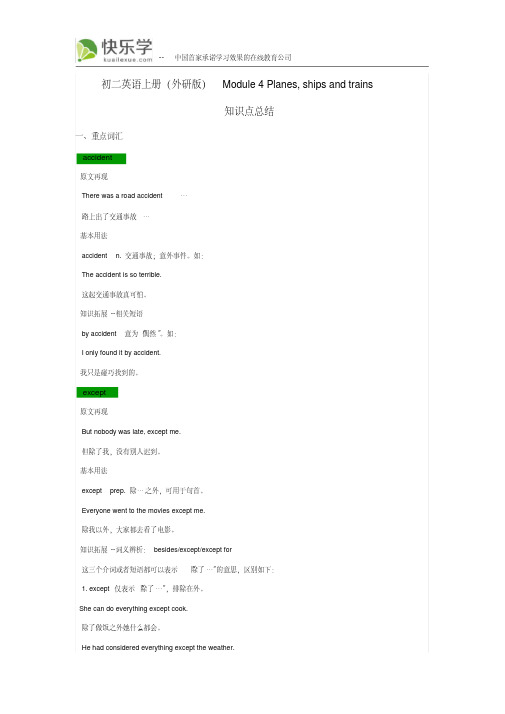
初二英语上册(外研版)Module 4 Planes, ships and trains知识点总结一、重点词汇accident·原文再现There was a road accident…路上出了交通事故…·基本用法accident n. 交通事故;意外事件。
如:The accident is so terrible.这起交通事故真可怕。
·知识拓展--相关短语by accident 意为“偶然”。
如:I only found it by accident.我只是碰巧找到的。
except·原文再现But nobody was late, except me.但除了我,没有别人迟到。
·基本用法except prep. 除…之外,可用于句首。
Everyone went to the movies except me.除我以外,大家都去看了电影。
·知识拓展--词义辨析:besides/except/except for这三个介词或者短语都可以表示“除了…”的意思,区别如下:1. except仅表示“除了…”,排除在外。
She can do everything except cook.除了做饭之外她什么都会。
He had considered everything except the weather.他什么都想过,唯独没考虑到天气。
2. besides表示“除了…还有…”的意思,表示包含在内。
Besides milk and cheese, we need vegetables.除了牛奶和干酪外,我们还需要蔬菜。
Besides football, I like playing basketball and table tennis.除了足球以外,我还喜欢打篮球和乒乓球。
3. except for表示“除了…”,except for后接的词同句子中的整体词(主语)不是同类的,指从整体中除去一个细节,一个方面;而except后接的词同整体词(主语)一般是同类,指在同类的整体中除去一个部分。
外研版八年级英语上册_Module_4_Planes__Ships_and_trains_Unit_2

Words: journey, book, park, outside, however, cost Phrases: plan to… because of outside the city centre Patterns: The more information, the better. What’s the cheapest way to get there? Have a great trip.
5 Work in pairs. Ask and answer about the ways of travelling. Use the information in the table. -What’s the cheapest way to travel from London to Paris? -The cheapest way is by coach.
2 Read the passage and number the ways of travelling from the most expensive to the least expensive.
4
3
1
2
3 Complete the table.
Ways of travelling Train Good points Bad points
n. 旅行;旅程 v. 预订 v. 停放(车);泊(车) prep. 在……之外 adv. 在外面;朝户外 n. 外面;外部 adj. 外部的;外表的 however adv. 然而;但是 cost v. 价钱为;花费 n. 价钱;成本;代价 journey book park outside
Do you know Holland?
Ways of Cost travellin g
外研版英语(新标准)八年级上册Module 4 Planes, ships and trains Unit 1 教案
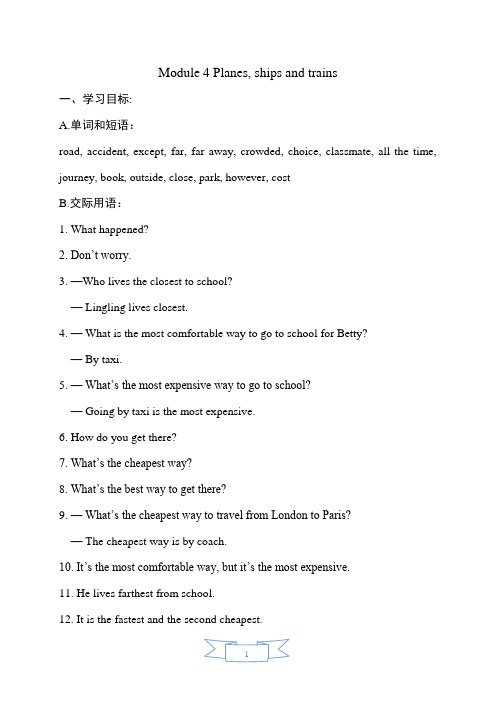
Module 4 Planes, ships and trains一、学习目标:A.单词和短语:road, accident, except, far, far away, crowded, choice, classmate, all the time, journey, book, outside, close, park, however, costB.交际用语:1. What happened?2. Don’t worry.3. —Who lives the closest to school?— Lingling lives closest.4. — What is the most comfortable way to go to school for Betty?— By taxi.5. —What’s the most expensive way to go to school?— Going by taxi is the most expensive.6. How do you get there?7. What’s the cheapest way?8. What’s the best way to get there?9. —What’s the cheapest way to travel from London to Paris?— The cheapest way is by coach.10. It’s the most comfortable way, but it’s the most expensive.11. He lives farthest from school.12. It is the fastest and the second cheapest.13. The more information, the better.二. 教学目标1. Function: Describing and comparing modes of transportation.2. Structure: Superlative adjectives and adverbs (-est, most); irregular superlatives.3. Skills: 1) Listening and understanding familiar topics (transportation)2) Comparing modes of transportation.3) Reading and finding specific transportation4) Writing a short passage comparing modes of transportation.4. Around the world: The longest railway5. Task: Making a holiday plan for a family trip to a city in China.三、重点及难点:Superlative adjectives and adverbs (-est, most); irregular superlatives.四、教学设计:Unit 1 He lives the farthest from school.ⅠTeaching modelListening and speakingⅡTeaching methodPWP approachⅢTeaching aims1. Key vocabulary: road, accident, except, far, far away, crowded, choice,classmate, close, all the time2. Key structures: superlative adjectives and adverbs (-est, most); irregularsuperlatives.3. Key sentences:1) What happened?2) Don’t worry.3) — Who lives the closest to school?— Lingling lives closest.4) — What is the most comfortable way to go to school for Betty?— By taxi.5) —What’s the most expensive way to go to school?— Going by taxi is the most expensive.ⅣTeaching aidsTape recorder, OHP, videoⅤTeaching StepsStep 1 Warming-up1. Work in pairs. Show some pictures and ask “How do you often go to school?”2. Look and say something about the pictures.3. Introduce the new words.4. Learn the new words.5. Read the new words.Step 2 Look and match.1. Ask the students to read the words in Activity 1.2. Look at the pictures in Activity 1 carefully.3. Now match the words with the pictures.5. Check the answers with the students.Keys: 1. train 2. ship 3. taxi 4. underground 5. busStep 3 Look, listen and match.1. Ask the students to read the words in Activity2.2. Play the recording and ask the students to listen to the recording carefully. T: Listen and match the words in the box with the pictures in Activity 1. You need to use one word more than once.3. Check the answers with the students.Step 4 Listen and read.1. Show some pictures, and ask the students to talk about them.2. Ask the students to read the conversation silently.3. Play the recording and ask the students to listen the conversation, and then answer the questions.1) How does Lingling go to school? Why?2) How do you think Betty will go to school?4. Read the conversation.5. Act it out.Step 5 Complete the table.1. Ask the students to read the conversation again.2. Now complete the table.3. Check the answers.Keys: by bus (by bike) by underground walks / on foot by bus Step 6 Complete the sentences.1. Ask the students to read the words in the box in Activity 4.2. Read the sentences.1) The _________________ way to go to school is by taxi.2) Tony lives the __________ from school.3) Lingling’s home is the _________ to school, so she always walks.4) For Betty, going to school by bike is the ______ choice.3. Complete the sentences with the correct words from the box.4. Check the answers:Keys: 1. most comfortable 2. farthest 3. closest 4. bestStep 7 Complete the sentences.1. Ask the students to read the words or expression in the box in Activity 5.2. Read through the sentences.1) All the students take the bus to school ___________ Sam.2) The ___________ train in the world is the Shanghai airport train.3) I saw a(n) __________ on the way to school yesterday.4) I do not take the bus to school because it is usually very ___________.3. Complete the sentences with the correct words from the box.4. Check the answers:Keys: 1. except 2. most modern 3. accident 4. crowdedStep 8 Pronunciation and speaking.1. Play the recording once without stopping.2. Play the recording again and ask the whole class to repeat.1) —Who lives the closest to school?— Lingling lives closest.2) — What is the most comfortable way to go to school for Betty?— By taxi.3. Ask the students to listen and mark the intonation.4. Now listen again and repeat.Step 9 Work in pairs.1. Ask the students to read the words or expression in the box in Activity 7.2. Read the example with the class.—What’s the most expensive way to go to school?— Going by taxi is the most expensive.3. Work in pairs.Step 10 Language points1. Maybe I should go to school by taxi. 或许我应该坐出租车去上学。
新外研版八上Module4 Planes,ships...
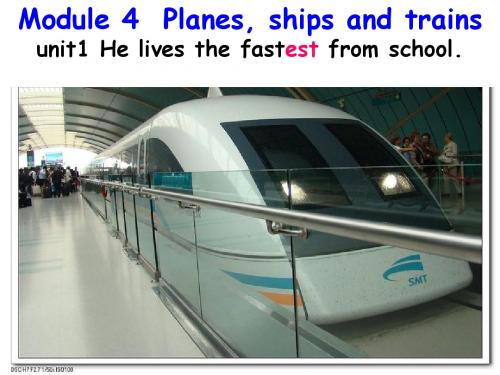
most comfortable 1. The ____________ way to go to school is by taxi. farthest 2. Tony lives the ___________ from school. closest 3. Lingling’s home is the ____________ to School, so she always walks. best 4. For Betty, going to school is the______ choice.
Pair work
A: How do you go to school ? B: I go to school by… /I take the…to school. A: How does your father/mother go to work? B: He/She goes to work…
Taking a bus is crowded.
Taking a train is more crowded.
Taking a subway is the most crowded of the three.
3km
Miss Wang’s home 7km
Mr Jin’s home
15km
1.Miss Wang lives far from the school. farther 2.Mr Jin lives ______ from the school.
3.Miss Liu lives farthest ________ from the school. Miss Liu’s home
Time for listening
八年级英语上册Module4Planesshipsandtrains知识点归纳总结新版外研版
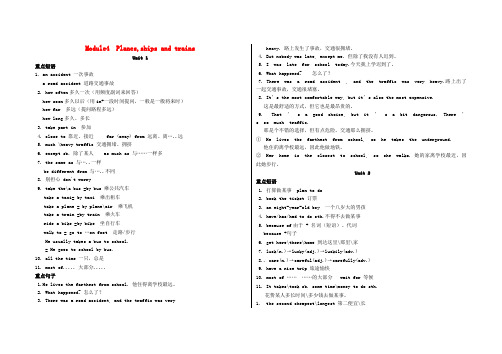
Module4 Planes,ships and trainsUnit 1重点短语1. an accident 一次事故a road accident 道路交通事故2. how often多久一次(用频度副词来回答)how soon多久以后(用in+一段时间提问,一般是一般将来时)how far 多远(提问路程多远)how long多久、多长3. take part in 参加4. close to 靠近、接近 far (away) from 远离、离…..远5. much \heavy traffic 交通拥堵、拥挤6. except sb. 除了某人 as much as 与……一样多7. the same as 与…..一样be different from 与…..不同8. 别担心 don't worry9. take the\a bus =by bus 乘公共汽车take a taxi= by taxi 乘出租车take a plane = by plane\air 乘飞机take a train =by train 乘火车ride a bike =by bike 坐自行车walk to = go to …on foot 走路/步行He usually takes a bus to school.= He goes to school by bus.10. all the time 一只,总是11. most of..... 大部分.....重点句子1.He lives the farthest from school. 他住得离学校最远。
2. What happened? 怎么了?3. There was a road accident, and the traffic was veryheavy. 路上发生了事故,交通很拥堵。
4. But nobody was late, except me. 但除了我没有人迟到。
新版外研社八年级上 Module4 Planes,ships and trains 全模块最全语法总结
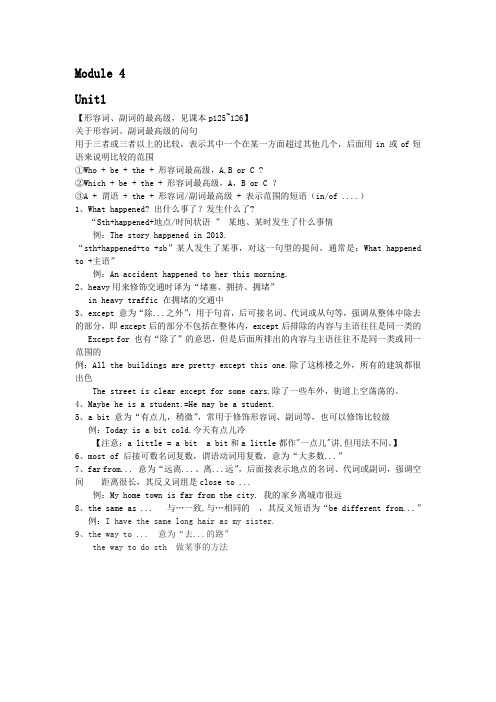
Module 4Unit1【形容词、副词的最高级,见课本p125~126】关于形容词、副词最高级的问句用于三者或三者以上的比较,表示其中一个在某一方面超过其他几个,后面用in 或of短语来说明比较的范围①Who + be + the + 形容词最高级,A,B or C ?②Which + be + the + 形容词最高级,A,B or C ?③A + 谓语 + the + 形容词/副词最高级 + 表示范围的短语(in/of ....)1、What happened? 出什么事了?发生什么了?“Sth+happened+地点/时间状语”某地、某时发生了什么事情例:The story happened in 2013.“sth+happened+to +sb”某人发生了某事,对这一句型的提问,通常是:What happened to +主语”例:An accident happened to her this morning.2、heavy用来修饰交通时译为“堵塞、拥挤、拥堵”in heavy traffic 在拥堵的交通中3、except 意为“除...之外”,用于句首,后可接名词、代词或从句等,强调从整体中除去的部分,即except后的部分不包括在整体内,except后排除的内容与主语往往是同一类的Except for 也有“除了”的意思,但是后面所排出的内容与主语往往不是同一类或同一范围的例:All the buildings are pretty except this one.除了这栋楼之外,所有的建筑都很出色The street is clear except for some cars.除了一些车外,街道上空荡荡的。
4、Maybe he is a student.=He may be a student.5、a bit 意为“有点儿,稍微”,常用于修饰形容词、副词等,也可以修饰比较级例:Today is a bit cold.今天有点儿冷【注意:a little = a bit a bit和a little都作"一点儿"讲,但用法不同。
2019年外研版八年级上册英语教案:Module4Planes,shipsandtrains

(三)实践活动(用时10分钟)
1.分组讨论:学生们将分成若干小组,每组讨论一个与旅行计划相关的实际问题,如如何从学校到达北京某景点。
2.实验操作:为了加深理解,我们将进行一个简单的角色扮演活动。学生们模拟在旅行社预订行程,练习使用所学词汇和时态。
1. Unit 1: Will you take the train to visit the Great Wall?
-交通工具词汇:plane, ship, train, bus, underground, taxi
-将来时态:will +动词原形
2. Unit 2: Which is the way to the Forbidden City?
-通过学习,学生能够运用目标词汇和句型进行旅行规划讨论。
2.文化意识:增强学生对国内外交通方式及文化的了解,培养跨文化交际意识。
-学生能够了解不同国家和地区的交通特点,尊重并包容文化差异。
3.思维品质:通过情景对话和小组讨论,锻炼学生的逻辑思维和批判性思维,提高问题解决能力。
-学生能在实际场景中灵活运用所学知识,进行有效沟通和问题解决。
-询问和描述路线的句型:Which way is...? How can I get to...?
-交通指示词汇:turn left, turn right, go straight
3. Unit 3: Language in use
-实际运用所学的交通工具和路线描述词汇、句型进行情景对话
-了解不同国家和地区的交通文化差异
外研新版八年级上册Module_4_Planes__ships_and_trains知识点及练习

Module 4 Planes, ships and trains知识点单词和短语:except除……之外far away远离;far away from远离(某地、某人等)crowded拥挤的book预订all the time一直,总是sometimes有时some times几次sometime在某时;多指在将来或过去的某一时刻= some time也可表示一段时间重要句型:1. But nobody was late, except me. 但是除了我之外没人迟到。
except 除……之外,除去;用于表示同类事物之间的关系。
(1) except 后面可接名词、代词、动词、副词、介词短语和从句等。
We have an English lesson every day except Sunday. 除星期天之外,我们每天都有一节英语课。
(2) except 常用在all, whole, any, every, no等词,及anything, anybody, anyone, everything, everybody, everyone等不定代词之后。
She ate everything on the plate except the carrot. 除了胡萝卜外,她把盘子里的东西都吃了。
(3) except for 除了……之外;用于表示理由或者细节,修正或补充前面说的情况。
Mr. Smith is a good man, except for his bad temper. 史密斯先生除了脾气不好外,是个好人。
The movie was good except for the ending.这部电影除了结尾之外都很好。
2. He lives the farthest from school, so he takes the underground. 他住的离学校最远,所以他坐地铁。
farthest/furthest是far的最高级形式。
外研版英语八年级上Module_4_Planes_ships_and_trains_unit1_
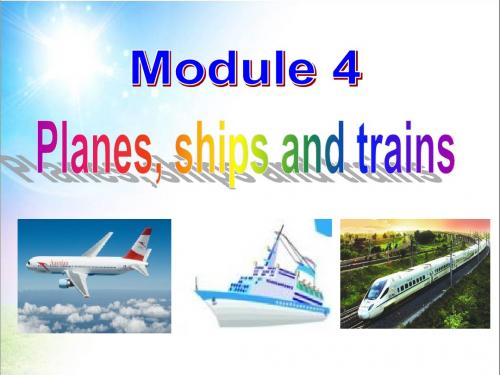
Match the words in the box with the pictures. bus ship taxi train underground train
ship
taxi
underground
bus
Listen and match the words in the box with the pictures in Activity 1. You need to use one word more than once.
busy cheap expensive modern
Enjoy listening!
Listen and answer
1. Why was Betty late for school?
Because there was a road accident, and the traffic was very heavy. 2. How do most of her classmates go to school? They ride bikes.
2. Maybe I should go to school by taxi.
或许我应该乘出租车上学。
(1)maybe “或许;可能”, 副词,在句中作状语,
相当于perhaps,常位于句首。
Eg. Maybe she’ll come this afternoon.
她可能今天下午来。
【辨析】
may be中,may是情态动词,be是动词原形,两
Wonderful sentences
Nobody was late, except me. was late, except me. Nobody 1. 没有人迟到,除了我。 2. 它是最舒服的方式,但是它也是最昂贵的。 It`s the most comfortable way, but it`s also the most It`sexpensive. themuch most comfortable way, but the most expensive. a it`s bit also = a little so +不可数名词 3. so 那是一个好的选择,但是有一点危险。有这么多交通车辆。 many +可数名词复数 That`s a good choice, but it`s a bit dangerous. There`s That`s a good choice, but it`s a bit dangerous. There`s so so much traffic. much traffic.
外研版八上《Module4Planes,shipsandtrains》(Unit3)ppt课件

To save time is to lengthen life. 节约时间就是延长生命。
take a bus
taxi stand
Module Grammar
不规则的形容词/副词的最高级 many/much—most good/well—best bad/badly/ill—worst little—least far—farthest 常用的有五个: many/much good/well little bad/badly/ill far 可以这样记:多好与一点点坏相差很远
形容词、副词最高级的特殊用法
(1)比较级 + than + any other + 名词单数 = 比较级 + than + the other + 名词复数 = the + 最高级 (2)序数词+形容词的最高级表示:“第几最……” (3)表示“最……之一”:one of +最高级+名词复数 (4)最高级前一般要加“the”;当最高级前有物主代词、指示代词、名词所有格等修饰时,则不加“the”。
Module 4 Planes, ships and trains Unit 3 Language in use
It’s the most comfortable way, but it’s also the most expensive. He lives the farthest from school. It is the fastest and the second cheapest. The more information, the better.
写出下列形容词或副词的最高级形式 1. slow _______ 2. large _______ 3. busy _______ 4. big _______ 5. carefully _____________ 6. badly _____ 7. beautiful _____________ 8. ill ______ 9. clean ________ 10. much _____
外研版八年级上册Module4 Planes, ships and trains 知识点讲解
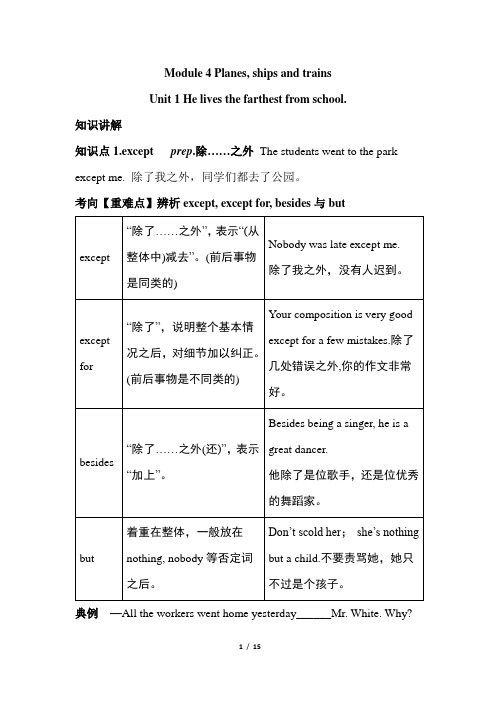
Module 4 Planes, ships and trainsUnit 1 He lives the farthest from school.知识讲解知识点1.except prep.除……之外The students went to the park except me. 除了我之外,同学们都去了公园。
考向【重难点】辨析except, except for, besides与but典例—All the workers went home yesterday______Mr. White. Why?—Because he was on duty.A.except B.besides C.except for D.beside【点拨】根据答语可知Mr. White在值班,没有回家,所以要表示“除了……之外”,而不包括除了的部分,因此用except。
知识点2.maybe adv.也许考向辨析一【重难点】perhaps,probably,maybe辨析二【重点】may,maybe与may be的区别与用法另maybe和may be有时可相互转换。
eg:You may be right. =Maybe you are right. 你或许是对的。
He may be in the office. =Maybe he is in the office. 他或许在办公室。
知识点3.by taxi 乘出租车表示动作的方式,同样的结构还有:by bus乘公共汽车;by plane 乘飞机;by ship 乘船典例—________do you go to work every day,Jimmy?—By bus,but sometimes by taxi. (合肥四校联考试卷)A.Why B.How C.What D.Whenby 是一个多义的介词,有多种用法。
考向一(表示方法、手段)通过,借助。
eg:I want to learn English by watching English movies. 我想通过看英语电影学习英语。
- 1、下载文档前请自行甄别文档内容的完整性,平台不提供额外的编辑、内容补充、找答案等附加服务。
- 2、"仅部分预览"的文档,不可在线预览部分如存在完整性等问题,可反馈申请退款(可完整预览的文档不适用该条件!)。
- 3、如文档侵犯您的权益,请联系客服反馈,我们会尽快为您处理(人工客服工作时间:9:00-18:30)。
on foot
by think we can get there___________ because it is _________________.
by bus
Self-test自我检测 1. Tony走路去上学。 on foot Tony goes to school_____ ________. 2.可以坐飞机去上海。 by plane We can get to Shanghai______ ______. 3.骑自行车是上学最有趣的方式。 The most interesting way to go to _____ ________ by bike school is ________ _________.
Tom
He goes to work by bike.
Mercy
She went to China by plane.
I went to this school by car. She goes to work by bus. He goes to shool by bike.
by+交通工具, 表示乘坐…, 位于句末。
写出下列单词的最高级 safest safe__________
most expensive expensive____________
安全的
quickest quick_________
贵的
most dangerous dangerous____________ 危险的 most crowded crowded____________ 拥挤的
快的 cheapest cheap________ 便宜的
Pair work
Going to school by bus Going to school by taxi Going to school by bike Going to school on foot
A:What's the cheaptest way to go to school? B: _____________________ is the cheapest . B: What's the quickest way to go to school? A: _____________________ is the quickest . A: What's the most expensive way to go to school? B: _________________ is the most expensive . B: What's the most interesting way to go to school? A: _________________ is the most interesting .
A: How do you go to school? B: I go to school by ______ / on foot(步行).
underground
taxi
train
bike
bus
plane
I went to this school by car.
Elena
She goes to work by bus.
Homework
Which is the most popular way to travel for the people in Huaying ? Why? Write a short passage to give your answer.
你认为华蓥人民最受欢迎的旅行方式是什么,写 一篇小短文陈述你的观点。
by bus 2.My father goes to work_______.
3.Betty went to London________. by plane
by ship 4.Tom went to Wuhan ________.
Listen and complete the table.
Tony Lingling Daming
创设情境,学以致用 Tomorrow, you will go to Huaying Mountain Square Good news for you (华蓥山广场)to be volunteers(志愿者). Please choose a transportation to get there and say out why you choose it.
形容词最高级
Brain-storm
by underground
underground
by taxi
by bus taxi
bus car
transportation交通工具 bike ship by bike by ship by car plane train by train
by plane
Do an interview
Cheer up! Enjoy your class!
Learning aims
1.To learn some key words and useful expressions about transportation.(交通) 2. To learn how to ues these key expressions. 3.To talk about transportation with superlative adjectives.
Show your choice
the the the the the the the the most comfortable most expensive cheapest most dangerous safest most crowded拥挤的 most interesting quickest
对三个或三个以上的人或事物进行比较时,用形容词 和副词的最高级形式来表达。 构成方法: 1. 一般在词尾加-est。 2.以字母e结尾的形容词/副词,直接加-st。 3. 以重读闭音节结尾的形容词/副词,如末尾只有 一个辅音字母,应先双写该字母,再加-est。 4.以辅音字母+y结尾的形容词/副词,变y为i再加 -est。 5.部分双音节词或多音节词,在词前加most。 注意:形容词的最高级前一般要加定冠词the.
by bus
Betty
by bus
Ways to go by underground walks to school
by bus
walk/on foot
by underground
比一比
by bus
on foot
by taxi
Which is the quickest way to go to school? by taxi is the quickest. Going to school_________
You are really great! Thank you! See you next time!
She went to China by plane.
What can you find among these sentences?
by+交通工具, 交通工具前 不加冠词
Sam goes to school by a train. A B C
Challenge yourself
by bike 1. Lucy goes to school________.
